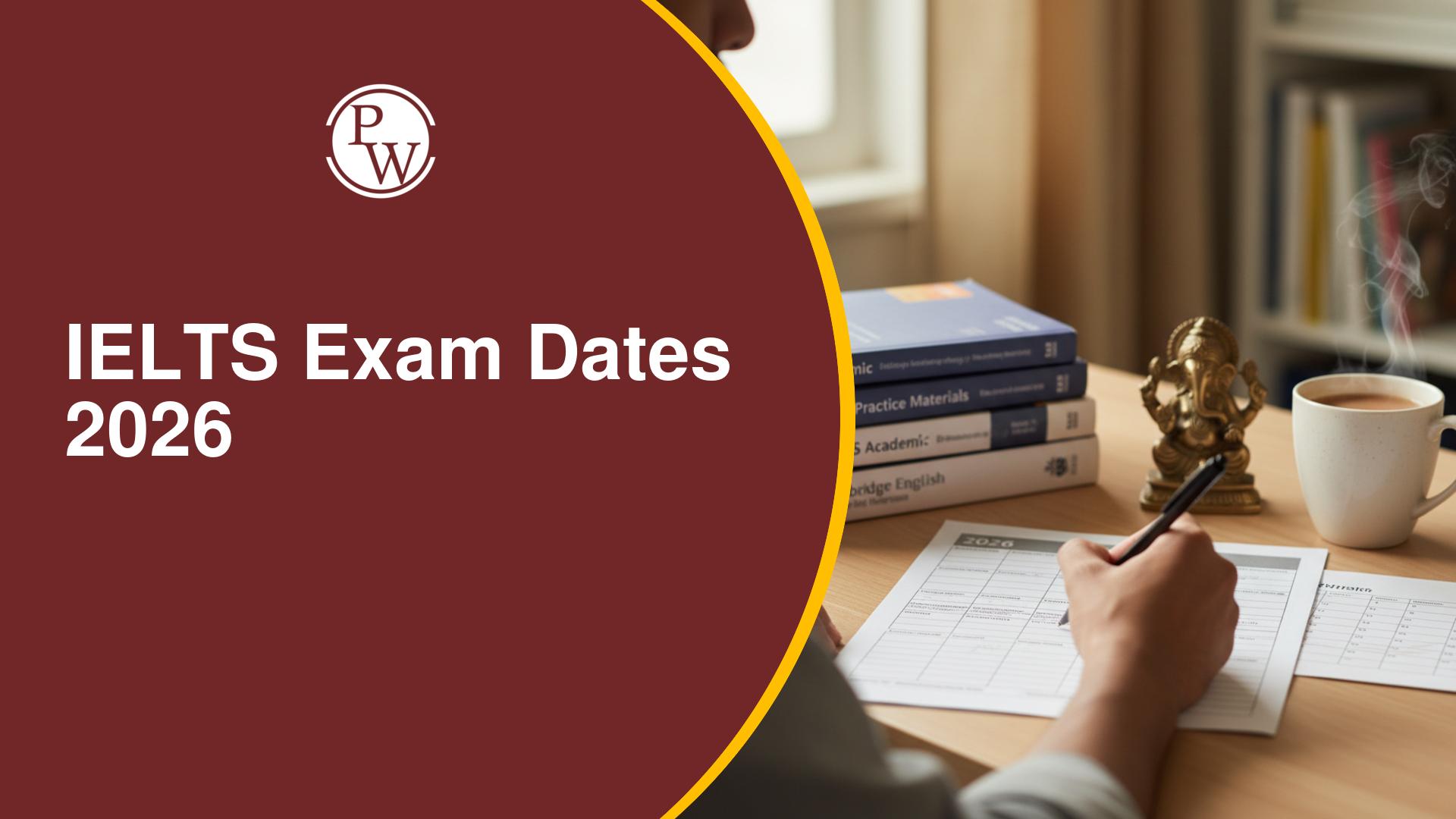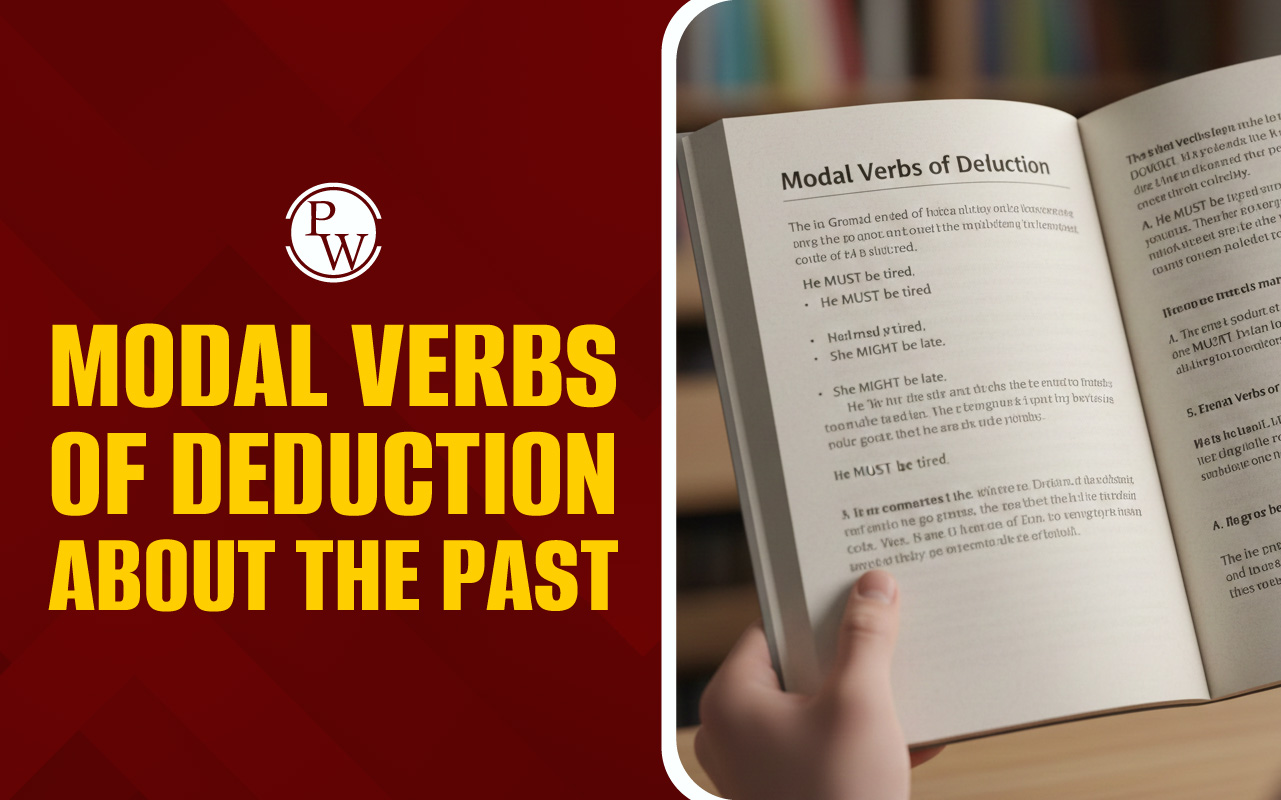
IELTS Writing 2025: The International English Language Testing System or IELTS has four test components: Listening, Reading, Writing, and Speaking. The IELTS Writing section comprises two tasks for both Academic and General Training tests. This test section is primarily responsible for assessing the candidate's ability to express ideas clearly and coherently in written English.
The IELTS Writing section is scored individually and graded based on four key criteria: Task Achievement, Coherence and Cohesion, Lexical Resource, and Grammatical Range and Accuracy. In this guide, we have included a detailed insight into the Writing section of the IELTS exam. Candidates preparing for the IELTS 2025 can gather more information about the test below.Click Here to Explore PW IELTS Online Courses
IELTS Writing 2025 Overview
Here’s an overview table summarizing the IELTS Writing section:| IELTS Writing 2025 Overview | ||
|---|---|---|
| Feature | Academic | General Training |
| Test Duration | 60 minutes | 60 minutes |
| Number of Tasks | 2 tasks | 2 tasks |
| Task 1 | Write a report based on visual data (e.g., graphs, charts, maps, diagrams). | Write a letter (formal, semi-formal, or informal). |
| Task 2 | Write an essay responding to a problem, argument, or point of view. | Write an essay responding to a problem, argument, or point of view. |
| Word Count | Task 1: Minimum 150 words Task 2: Minimum 250 words | Task 1: Minimum 150 words Task 2: Minimum 250 words |
| Scoring Criteria | Task Achievement (Task 1) / Task Response (Task 2), Coherence & Cohesion, Lexical Resource, Grammatical Range & Accuracy | Task Achievement (Task 1) / Task Response (Task 2), Coherence & Cohesion, Lexical Resource, Grammatical Range & Accuracy |
| Skills Assessed | Ability to present data and trends, describe processes, and argue logically. | Ability to communicate, express opinions, and construct logical arguments. |
| Key Differences | Focus on academic/formal tone and structure. | Focus on everyday situations and less formal contexts. |
Practice Free IELTS Writing Practice Tests
| Cambridge 1 Reading Practice Tests PDFs for IELTS | |
|---|---|
| IELTS Reading Practice Test 1 | Download Now |
| IELTS Reading Practice Test 2 | Download Now |
| IELTS Reading Practice Test 3 | Download Now |
| IELTS Reading Practice Test 4 | Download Now |
| IELTS Reading Practice Test 5 | Download Now |
| IELTS Reading Practice Test 6 | Download Now |
| IELTS Reading Practice Test 7 | Download Now |
| IELTS Reading Practice Test 8 | Download Now |
| IELTS Reading Practice Test 9 | Download Now |
| IELTS Reading Practice Test 10 | Download Now |
IELTS Writing 2025 Test Pattern
The IELTS Writing test pattern is divided into two tasks, each designed to assess different writing skills. Below is a detailed test pattern for the IELTS Writing section, covering both the Academic and General Training formats.| IELTS Writing Test Pattern | ||
|---|---|---|
| Component | IELTS Writing Task 1 | IELTS Writing Task 2 |
| Type of Task | Academic: Summarize, describe, or explain visual data (graphs, charts, maps, or diagrams). General: Write a letter (formal, semi-formal, or informal). | Write an essay presenting an argument, problem, or opinion. |
| Duration | Suggested: 20 minutes | Suggested: 40 minutes |
| Word Count | Minimum 150 words | Minimum 250 words |
| Focus Areas | Academic: Analyze and summarize visual data. General: Respond appropriately to a given situation (e.g., request, explain, complain). | Develop ideas, provide examples, and maintain a clear and logical argument. |
| Tone/Style | Academic: Formal | Formal |
| Marking Criteria | Task Achievement: Fulfilling the task requirements. Coherence & Cohesion: Logical structure and use of linking words. Lexical Resource: Vocabulary range and accuracy. Grammatical Range & Accuracy: Correct grammar and sentence variety. | Task Response: Addressing the question fully with well-developed ideas. Coherence & Cohesion: Logical flow and organization. Lexical Resource: Vocabulary richness and accuracy. Grammatical Range & Accuracy: Error-free sentences and variety in sentence structure. |
| Scoring Weightage | 33% of the total writing score | 67% of the total writing score |
| Common Question Types | Academic: Bar chart, pie chart, line graph, table, process diagram, maps. General: Formal letter, semi-formal letter, informal letter. | Opinion essay, discussion essay, problem-solution essay, advantage-disadvantage essay. |
IELTS Writing 2025 Academic and General Training
IELTS Academic Writing: The Academic section of the Writing test is specially designed for international students applying to different abroad universities in popular English-speaking countries. A few popular features of the IELTS Academic Writing test are as follows:- Formal writing style.
- Analytical and data interpretation skills are required.
- The IELTS Writing test in the Academic session has two tasks:
- Task 1: Describe visual data or information (charts, graphs, and diagrams)
- Task 2: Essay on an academic topic (formal essay writing)
- Semi-formal or informal writing.
- Real-life communication tasks.
- Task 1 involves writing a letter (formal/informal).
- Task 2 involves writing an essay on a general topic.
IELTS Writing Task 1 and Task 2 Difference
The IELTS Writing section is divided into two tasks: Task 1 and Task 2 for the Academic and General Training modules. While Task 1 focuses on summarizing information or writing letters, on the other hand, Task 2 includes essay writing. Understanding the differences between these tasks is crucial for effective preparation. The table below highlights the key differences between IELTS Writing Task 1 and Task 2 for both Academic and General Training modules.| Criteria | Task 1 (Academic) | Task 1 (General) | Task 2 (Both) |
|---|---|---|---|
| Purpose | Describe visual data | Write a letter | Present an argument/opinion |
| Structure | Introduction, Overview, Details | Greeting, Body, Closing | Introduction, Body, Conclusion |
| Word Limit | 150 words | 150 words | 250 words |
| Time Allocation | 20 minutes | 20 minutes | 40 minutes |
| Scoring Criteria | Task Achievement, Coherence and Cohesion, Lexical Resource, Grammatical Range and Accuracy | Task Achievement, Coherence and Cohesion, Lexical Resource, Grammatical Range and Accuracy | Task Response, Coherence and Cohesion, Lexical Resource, Grammatical Range and Accuracy |
Tips for IELTS Writing
The IELTS Writing section is a crucial component of the exam. Whether you're taking the Academic or General Training version, mastering the writing section requires a strong command of grammar, vocabulary, and structure. Below are some essential tips to help you excel in the IELTS Writing section.| IELTS Writing Common Tips | Description |
|---|---|
| Understand the Task | Carefully read the instructions for each task. Identify the key information and what is expected of you. |
| Plan Your Response | Before writing, create a brief outline to structure your ideas and ensure you cover all aspects of the task. |
| Use a Variety of Sentence Structures | Avoid simple, repetitive sentences. Incorporate complex sentences and a range of grammatical structures to demonstrate your language proficiency. |
| Expand Your Vocabulary | Learn and practice using a wide range of vocabulary related to different topics. |
| Practice Regularly | Consistent practice is crucial for improving your writing skills. Write regularly and get your essays reviewed by a qualified teacher or tutor. |
| Focus on Accuracy | Pay attention to grammar, spelling, and punctuation. Proofread your work carefully before submitting it. |
IELTS Writing Test Sample Questions
Here are some sample questions for the IELTS Academic Writing section: IELTS Academic Writing Task 1:- The graph below shows the population growth in three major cities between 2000 and 2020. Summarize the information by selecting and reporting the main features.
- Describe the process of water purification as shown in the diagram below.
- Some people believe that university education should be free for all students. To what extent do you agree or disagree?
- Discuss the advantages and disadvantages of using technology in the classroom.
- You recently visited a restaurant and want to provide feedback. Write a letter to the manager.
- Write a letter to your friend inviting them to your housewarming party.
- Some people believe that working from home improves productivity. Discuss both views and give your opinion.
- The government should invest more in public transportation. To what extent do you agree or disagree?
IELTS Writing Study Resources
Preparing for the IELTS Writing section requires a strategic approach to improve both your writing skills and test performance. Here, we have compiled a list of essential resources that cover everything from sample questions and practice tests to expert tips and evaluation criteria to help students with their IELTS test preparation.- Official IELTS Practice Materials (British Council, IDP, Cambridge)
- Cambridge IELTS Series
- IELTS.org (Official website)
- British Council IELTS Preparation Tools
- IDP IELTS Support Tools
Guidance of PW IELTS
Physics Wallah offers a few popular online IELTS courses for all students. Follow the latest IELTS articles to start preparing for the exam.| IELTS Exam Other Related Links | |
|---|---|
| IELTS Registration | IELTS Eligibility Criteria |
| IELTS Exam Pattern | IELTS Syllabus |
| IELTS Exam Dates | IDP IELTS Test Centers |
IELTS Writing FAQs
Q. How can I get 8.5 in IELTS Writing?
Ans. To get an 8.5 in IELTS Writing, master Task Achievement, coherence, vocabulary, and grammar. Plan, use complex sentences, expand vocabulary, and practice regularly.
Q. How do I prepare for IELTS Writing?
Ans. To prepare for the IELTS Writing test, understand the format, practice tasks, build vocabulary, focus on grammar, and seek expert feedback.
Q. Is a 7.5 IELTS score easy?
Ans. No, a 7.5 IELTS score is not easy, however, it is achievable with consistent practice in all sections and strong language skills.
Q. How can I pass IELTS Writing?
Ans. To pass the IELTS Writing test, address tasks fully, use clear structure, meet word limits, and proofread.
Talk to a counsellorHave doubts? Our support team will be happy to assist you!

Free Learning Resources
PW Books
Notes (Class 10-12)
PW Study Materials
Notes (Class 6-9)
Ncert Solutions
Govt Exams
Class 6th to 12th Online Courses
Govt Job Exams Courses
UPSC Coaching
Defence Exam Coaching
Gate Exam Coaching
Other Exams
Know about Physics Wallah
Physics Wallah is an Indian edtech platform that provides accessible & comprehensive learning experiences to students from Class 6th to postgraduate level. We also provide extensive NCERT solutions, sample paper, NEET, JEE Mains, BITSAT previous year papers & more such resources to students. Physics Wallah also caters to over 3.5 million registered students and over 78 lakh+ Youtube subscribers with 4.8 rating on its app.
We Stand Out because
We provide students with intensive courses with India’s qualified & experienced faculties & mentors. PW strives to make the learning experience comprehensive and accessible for students of all sections of society. We believe in empowering every single student who couldn't dream of a good career in engineering and medical field earlier.
Our Key Focus Areas
Physics Wallah's main focus is to make the learning experience as economical as possible for all students. With our affordable courses like Lakshya, Udaan and Arjuna and many others, we have been able to provide a platform for lakhs of aspirants. From providing Chemistry, Maths, Physics formula to giving e-books of eminent authors like RD Sharma, RS Aggarwal and Lakhmir Singh, PW focuses on every single student's need for preparation.
What Makes Us Different
Physics Wallah strives to develop a comprehensive pedagogical structure for students, where they get a state-of-the-art learning experience with study material and resources. Apart from catering students preparing for JEE Mains and NEET, PW also provides study material for each state board like Uttar Pradesh, Bihar, and others
Copyright © 2026 Physicswallah Limited All rights reserved.






